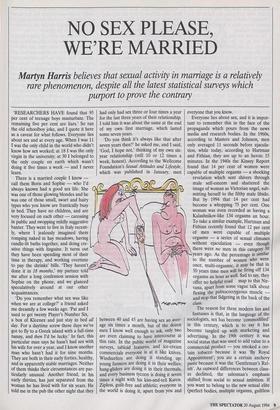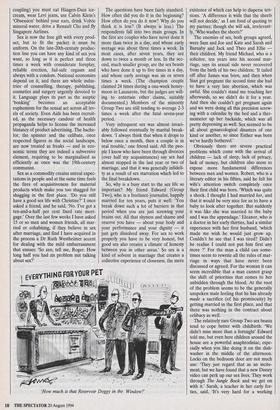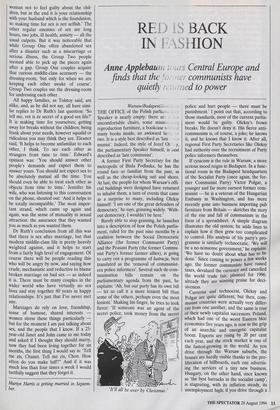NO SEX PLEASE, WE'RE MARRIED
Martyn Harris believes that sexual activity in marriage is a relatively
rare phenomenon, despite all the latest statistical surveys which purport to prove the contrary
`RESEARCHERS HAVE found that 95 per cent of teenage boys masturbate. The remaining five per cent are liars.' So ran the old schoolboy joke, and I quote it here as a caveat for what follows. Everyone lies about sex and at every age. When I was 11 I was the only child in the world who didn't know how sex worked; at 18 I was the only virgin in the university; at 30 I belonged to the only couple on earth which wasn't doing it five times a week — and I never learn.
There is a married couple I know call them Boris and Sophie — who I'd always known had a good sex life. She was one of those glowing blondes and he was one of those small, swart and hairy types who you know are frantically busy in bed. They have no children, and are very focused on each other — caressing in public and swopping mildly suggestive banter. They went to live in Italy recent- ly, where I jealously imagined them romping naked in hay meadows, having candle-lit baths together, and doing cre- ative things with linguine. It turns out they have been spending most of their time in therapy, and working overtime to pay the shrinks' bills. 'They haven't done it in 18 months,' my partner told me after a long confession session with Sophie on the phone, and we glanced speculatively around at our other acquaintances.
`Do you remember what sex was like when we are at college?' a friend asked me dreamily a few weeks ago. 'Pat and I used to get twenty Player's Number Six, a box of Kleenex and just stay in bed all day. For a daytime screw these days we've got to fly to a Greek island with a full-time nanny, and then I'd be lucky.' In fact, this particular man says he hasn't had sex with his wife for over a year, and I know another man who hasn't had it for nine months. They are both in their early forties, healthy, and in apparently stable marriages. Neither of them thinks their circumstances are par- ticularly unusual. Another friend, in his early thirties, has just separated from the woman he has lived with for six years. He told me in the pub the other night that they had only had sex three or four times a year for the last three years of their relationship. I told him it was about the same at the end of my own first marriage, which lasted some seven years.
`Do you think it's always like that after seven years then?' he asked me, and I said, `God, I hope not,' thinking of my own six- year relationship (still 10 or 12 times a week, honest). According to the Wellcome Foundation's Sexual Attitudes and Lifestyle, which was published in January, men between 40 and 45 are having sex an aver- age six times a month, but of the dozen men I know well enough to ask, only two are even claiming to have intercourse at this rate. In the public world of magazine surveys, tabloid features, andice-cream commercials everyone is at it like knives. Windsurfers are doingit standing up; i young farmers are doing it in their wellies; hang-gliders are doing it in their thermals, and every business tycoon is doing it seven times a night with his kiss-and-tell Karen. Zipless, guilt-free and athletic; everyone in the world is doing it, apart from you and everyone that you know.
Everyone lies about sex, and it is impor- tant to remember this in the face of the propaganda which pours from the news media and research bodies. In the 1960s, according to Masters and Johnson, men only averaged 11 seconds before ejacula- tion, while today, according to Hartman and Fithian, they are up to an heroic 15 minutes. In the 1940s the Kinsey Report found that 14 per cent of women were capable of multiple orgasms — a shocking revelation which sent shivers through male self-esteem and shattered the image of woman as Victorian angel, sub- mitting herself to the filthy male libido. But by 1994 that 14 per cent had become a whopping 75 per cent. One woman was even recorded as having a Kalashnikov-like 134 orgasms an hour. To take a similar example, Hartman and Fithian recently found that 12 per cent of men were capable of multiple orgasms — a series of sexual climaxes without ejaculation — even though there were no men in this category 50 years ago. As the percentage is similar to the number of women who were once, multi-orgasmic, it may be that in 50 years time men will be firing off 134 orgasms an hour as well. Sad to say, they offer no helpful road map to this Nir- vana, apart from some vague talk about flexing the pubiococcygeous muscle and stop that fidgeting in the back of the The reason for these modern lies and fantasies is that, in the language of the sociologists, sex has become `commodified' in this century, which is to say it has become tangled up with marketing and advertising. In the 19th century it was social status that was used to add value to a commercial product — you smoked a cer- tain tobacco because it was 'By Royal Appointment'; you ate a certain anchovy paste because it was the 'Gentleman's Rel- ish'. As outward differences between class- es declined, the salesman's emphasis shifted_ from social to sexual ambition. If you want to belong to the new sexual elite (perfect bodies, multiple orgasms, guiltless coupling) you must eat Haagen-Dazs ice- cream, wear Levi jeans, use Calvin Klein's `Obsession' behind your ears, drink Volvic mineral water, drive a Renault Clio and fly Singapore Airlines.
Sex is now the free gift with every prod- uct, but to fit the packet it must be uniform. On the late-20th-century produc- tion line you can have any kind of sex you want, so long as it is perfect and three times a week with considerate foreplay, reliable erection, fail-safe orgasm and always with a condom. National economies depend on it, and there are whole indus- tries of counselling, therapy, publishing, cosmetics and surgery urgently devoted to it. Language plays its part as the aseptic 'honking' becomes an acceptable euphemism for the sexual act across all lev- els of society. Even Aids has been recruit- ed, as the necessary candour of health propaganda helps to license the increased blatancy of product advertising. The bache- lor, the spinster and the celibate, once respected figures in the social landscape, are now treated as freaks — and in eco- nomic terms they are indeed a subversive element, requiring to be marginalised as efficiently as once was the 19th-century communist.
Sex as a commodity creates unreal expec- tations in people and at the same time fuels the fires of acquisitiveness for material products which make you too shagged for shagging in the first place. 'Do you still have a good sex life with Christine?' I once asked a friend, and he said, `No. I've got a ten-and-a-half per cent fixed rate mort- gage.' Over the last few weeks I have asked 15 or so men and women friends, all mar- ried or cohabiting, if they believe in sex after marriage, and find I have acquired in the process a Dr Ruth Westheimer accent for dealing with the mild embarrassment that ensues: 'So zen, tell me, Roger. How long haft you had zis problem mit talking about sex?' The questions have been fairly standard. How often did you do it in the beginning? How often do you do it now? Why do you think it is less? (It always is less.) The respondents fall into two main groups. In the first are couples who have never done it more than twice in a day, and whose early average was about three times a week. In most cases, after seven years, they are down to twice a month or less. In the sec- ond, much smaller group, are the sex beasts who have done it up to five times in a day, and whose early average was six or seven times a week. (The champion couple claimed 24 times during a one-week honey- moon in Lanzarote, but the judges are will- ing to entertain other claims, suitably documented.) Members of the minority Group Two are still tending to average 2-3 times a week after the fatal seven-year period.
Very infrequent sex was almost invari- ably followed eventually by marital break- down. 'I always think that when it drops to below once a month, then a couple is in real trouble,' one friend said. All the peo- ple I know who have been through divorces (over half my acquaintances) say sex had almost stopped in the last year or two of marriage, and that it was generally infideli- ty as a result of sex starvation which led to the final breakdown.
So, why is a busy start to the sex life so important? My friend Edward (Group Two), who is a freelance journalist, happily married for ten years, puts it well: 'You break down such a lot of barriers in that period when you are just screwing your brains out. All that shyness and shame and reserve you have — about your body and your performance and your dignity — it just gets dissolved away. For sex to work properly you have to be very honest, but good sex also creates a climate of honesty between you in other areas.' So sex is a kind of solvent in marriage that creates a collective experience of closeness, the mere `How much is that Reservoir Doggy in the Window?' existence of which can help to disperse ten- sions. 'A difference is wide that the sheets will not decide,' as I am fond of quoting to my partner, though she will ask, irrelevant- ly, 'Who washes the sheets?'
The enemies of sex, both groups agreed, were Sam and Joe and Kate and Sarah and Bamaby and Jack and Theo and Ellie their children. My friend Michael, who is a solicitor, ten years into his second mar- riage, says its sexual side never recovered from the birth of his two children: 'It tailed off after James was born, and then when Sian got pregnant the second time she had to have a very late abortion, which was awful. She couldn't stand me touching her afterwards, so we didn't do it for a year. And then she couldn't get pregnant again and we were doing all this precision screw- ing with a calendar by the bed and a ther- mometer up her backside, which was all pretty depressing as well. Sex seemed to be all about gynaecological disasters of one kind or another, so since Esther was born we've hardly bothered.'
Obviously there are severe practical problems which come with the arrival of children — lack of sleep, lack of privacy, lack of money, but children also seem to expose more fundamental differences between men and women. Robert, who is a literary editor in his fifties, said he felt his wife's attention switch completely once their first child was born. 'Which was quite a shock. I thought I had married her, and that it would be very nice for us to have a baby to look after together. But suddenly it was like she was married to the baby and I was the appendage.' Eleanor, who is a doctor in her early thirties, had a similar experience with her first husband, 'which made me wish he would just grow up. Couldn't he see that I was tired? Didn't he realise I could not put him first any more ?' For the man a child can some- times seem to rewrite all the rules of mar- riage in ways that have never been discussed or agreed. For the woman it can seem incredible that a man cannot grasp the shift of priorities that comes to her unbidden through the blood. At the root of the problem seems to be the generally unspoken male feeling that he has already made a sacrifice (of his promiscuity) by getting married in the first place, and that there was nothing in the contract about celibacy as well.
The relatively rare Group Two sex beasts tend to cope better with childbirth. 'We didn't miss more than a fortnight' Edward told me, but even here children around the house are a powerful anaphrodisiac, espe- cially when you like doing it on the dish- washer in the middle of the afternoon. Locks on the bedroom door are not much use: 'They just regard that as an incite- ment, but we have found that a new Disney video can perk up our sex lives. They work through The Jungle Book and we get on with it.' Sarah, a teacher in her early for- ties, said, 'It's very hard for a working woman not to feel guilty about the chil- dren, but in the end it is your relationship with your husband which is the foundation, so making time for sex is not selfish.' The other regular enemies of sex are long hours, two jobs, ill health, anxiety — all the usual culprits. But it was noticeable that while Group One often abandoned sex after a disaster such as a miscarriage or serious illness, the Group Two people seemed able to pick up the pieces again after a gap. Group One couples acquire that curious middle-class accessory — the dressing-room, 'but only for when we are keeping each other awake of course'. Group Two couples use the dressing-room for undressing each other.
All happy families, as Tolstoy said, are alike, and, as he did not say, all have simi- lar replies to Dr Ruth's last question: 'So tell me, vot is ze secret of a good sex life?' It is making time for yourselves; getting away for breaks without the children; being frank about your needs, however squalid or ridiculous you may think they are. Eleanor said, 'It helps to become unfamiliar to each other, I think. To see each other as strangers from time to time.' Edward's opinion was: 'You should answer other people's demands and expect them to answer yours. You should not expect sex to be absolutely mutual all the time. You should even be able to treat each other as objects from time to time.' Jennifer his wife, who was listening to this conversation on the phone, shouted out: 'And it helps to be totally incompatible.' The most impor- tant strand, which came up again and again, was the sense of mutuality in sexual attraction: the assurance that they wanted you as much as you wanted them.
Dr Ruth's conclusion from all this was that there is sex after marriage, but that modern middle-class life is pretty heavily weighted against, and it helps to start from a fairly high level of engagement. Of course there will be people reading this who will be angry by now, and saying how crude, mechanistic and reductive to blame broken marriage on bad sex — as indeed it is. There must be many couples in the wider world who have virtually no sex lives and stay together 60 years in happy relationships. It's just that I've never met any.
Marriages do rely on love, friendship, sense of humour, shared interests women stress these things particularly but for the moment I am just talking about sex, and the people that I know. If a 25- year-old Janet and John came to me today and asked if I thought they should marry, now they had been living together for six months, the first thing I would say is: 'Tell me zis, Chanet. Tell me zis, Chon. How often do you make luff?" And if it was much less than four times a week I would tactfully suggest that they forget it.
Marlyn Harris is getting married in Septem- ber.




















































 Previous page
Previous page